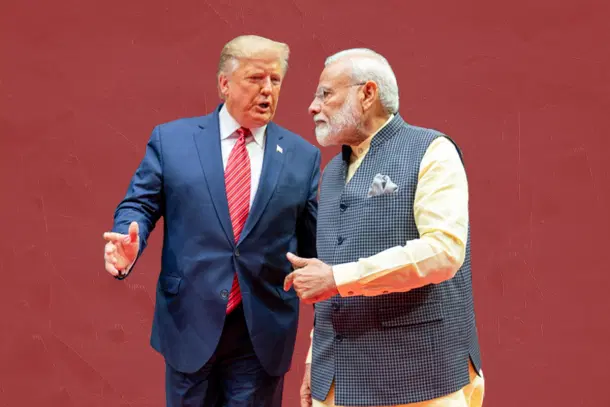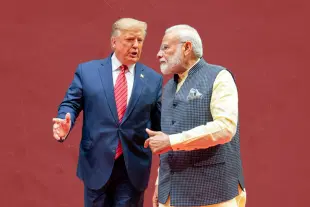World
What Could Modi And Trump Do To Safeguard Bangladesh’s Stability And Hindu Minorities?
Vansh Gupta
Nov 16, 2024, 11:44 AM | Updated Nov 22, 2024, 06:49 PM IST
Save & read from anywhere!
Bookmark stories for easy access on any device or the Swarajya app.


This is an edited excerpt from a longer conversation on the podcast Trump's Win: What Next For Bangladesh's Hindus, Hasina, & Yunus with Jaideep Mazumdar. To listen to the full episode on Spotify, click here, and for the app, click here.
With the recent political shifts in Bangladesh, Prime Minister Narendra Modi and President-elect Donald Trump face a pressing question: how to address the escalating violence against religious minorities, especially Hindus, and restore stability in Bangladesh.
The rise of Muhammad Yunus, a close associate of the American Democratic establishment, to the role of Chief Adviser has raised concerns. Yunus, a known ally of prominent Democrats like the Clintons and Obamas, entered office with high expectations under the Biden administration's watch, confident of a sympathetic global silence towards Bangladesh's internal issues.
This quiet tolerance for human rights abuses shifted when Trump posted on X on 31 October, condemning what he described as "barbaric violence" against Bangladesh’s minorities.
Trump’s post broke the silence, shedding light on the plight of minority communities and Bangladesh’s growing unrest. However, for Modi and Trump to make a meaningful impact, a strategic approach is crucial.
1. Not Washington's Priority
First, it’s essential to acknowledge that Bangladesh is unlikely to be an immediate priority for Trump when he takes office in January. Facing a complex domestic agenda, including economic reforms, tax cuts, immigration policies, and the ever-present challenge of China, Trump’s focus will initially remain domestic and strategic. Bangladesh, though a humanitarian concern, sits lower on the list.
Modi, therefore, may need to step in and prompt the US to address Bangladesh’s unrest and religious violence as an international priority.
2. India’s Role in Raising Awareness
Given the urgency of the situation, the Modi government can offer a proactive voice. India shares not only geographic proximity but also cultural and social ties with Bangladesh, making it well-placed to advocate for immediate international intervention.
Modi could leverage diplomatic channels to ensure that Washington understands the gravity of the situation and pressures Yunus into addressing the attacks on minorities, primarily Hindu Communities.
This intervention, ideally, would prompt the Bangladeshi leadership to implement protections for vulnerable groups, limiting violence and restoring a semblance of order.
3. Pushing for Early Elections
Beyond immediate pressure, Modi and Trump could jointly advocate for early elections in Bangladesh, a demand already echoed by the Bangladesh Nationalist Party (BNP).
The opposition party, which is gaining momentum, insists on Yunus stepping down within a year, allowing for a new administration that might be better-placed to protect minority rights and maintain stability.
Working alongside the US, India can push Bangladesh’s administration and international allies to hold elections sooner rather than later, ensuring a peaceful transition and a government more aligned with democratic principles.
4. Issue Might Persist
Even with these interventions, attacks on minorities, especially against Hindus, may not cease entirely. Observers suggest that after the US election, while large-scale violence may decline, isolated attacks could continue in a “low key” manner.
Such incidents, though smaller in scope, might still pose a significant threat to minorities without drawing widespread international attention. By fostering stronger institutional safeguards, Modi and Trump can help establish a sustainable framework for minority protection in Bangladesh, even if the threats remain latent.
In conclusion, while immediate, sweeping change is unlikely, Modi and Trump have avenues to impact Bangladesh’s trajectory meaningfully. Through India’s diplomatic advocacy, US support, and early election pressures, there is potential to reduce violence, safeguard minority rights, and steer Bangladesh towards a more stable and inclusive future.
Vansh Gupta is an Editorial Associate at Swarajya.





